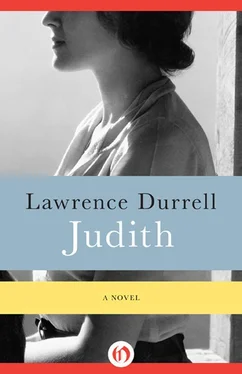As for Lawton, a man both purposeful and wise, the new epoch was both intoxicating and equivocal. He felt himself slipping into a hopeless infatuation and even Carstairs, who was so frequently in their company, registered his disquiet by forgetting to tease him. Some of their conversations stayed in his mind as disturbing and touching.
One evening, at a cocktail party, Carstairs had plied her with drinks so strong that, when they left the hotel, Lawton saw she was reeling. He took her by the arm and walked her in the garden for a little while, debating whether she would be able to carry out the planned programme for that evening, which included a midnight swim.
“I think,” he said, “I’d better take you home.” She glared at him unsteadily and sat down with a bump on a marble bench. Smiling wanly she said: “How lucky you people are, Hugh; tonight I suddenly felt so lost, just looking at you all at the party.”
“Looking at us all?” he echoed.
“You belong somewhere. You are substantially yourselves. It made me feel all over the place, German, Jewish, Hungarian… nothing .”
“Is that really a reason?” he said gently.
“No,” she said, “but it is part of a reason. All the other things about me you know… or nearly all. Except one.”
He kissed her hands and put them back, folded, into her lap. “I’m going to fetch you a black coffee to sober you up,” he said. “Promise you will stay here until I get back?”
“I promise.”
But no sooner had his tall figure disappeared into the lighted entrance of the hotel than she rose and, still walking somewhat unsteadily, crossed the garden and slipped through the gate. Though she was in evening dress, her appearance did not arouse much comment or interest in this part of the town, which was very European; but presently, in order to reach her apartment, she had to traverse a maze of twisted narrow streets with flaring stalls of market-vendors — a corner of the Arab quarter. Arab music sounded everywhere with its shrill quarter-tones, and she was jostled and shoved by the motley throng as she passed, no longer so obviously drunk, but still apparently in a trance. On a sudden impulse she entered a low-roofed Arab tavern and sat down at a sanded wooden table to order a glass of arak; but the eyes of a misshapen Arab youth in the corner rested upon her with a kind of calculating insolence and she sprang up once more, spilling her drink. She threw down money from her glittering evening bag upon the table — a rash move — and walked faster down the twisted streets towards her flat, aware that now she was being followed.
She heard the steps behind her but did not dare look round, for fear that the last of her courage would desert her if she did so. At times she stopped dead, and the steps behind her stopped dead as well. Once only, as she crossed a lighted street with a few shops in it, and feeling more courageous because of the lighted shop-fronts, she turned about. But the street was empty. Down the last long dark street she broke and ran, slamming the heavy front door of the apartment block behind her at last, panting with relief. Then through the frosted glass she saw the shadow of a man standing, as if in deep thought, on her front porch. It was Lawton. She opened the door once more and they stared at each other for a long moment.
“It was only to see you safely home,” he said in a low voice, apologetically; and now suddenly she was reeling with fatigue, once more overcome by the incoherence and drunkenness of the earlier part of the evening. She fell against him, and he stooped to pick her up. He walked softly, circumspectly up to the first floor with her and, pushing open the door of her flat, walked into it with his burden.
“You are tired,” he said.
He crossed the dark room and laid her down upon the sofa; a street lamp shone with an unearthly glow-worm light through the pane of glass, lighting up her sad and vague expressions.
“I haven’t been fair to you, Hugh,” she said indistinctly and, as if the thought had stung her, she said:
“Come here, oh come here and sit beside me.” And when he obeyed she reached out her arms and put them round him, saying incoherently: “You know how much I think of you, don’t you?” With her lips she searched his, but he evaded her embrace, all the while staring at her with a fixed and melancholy stare.
“Don’t you want me?” she whispered at last, gazing at him, with a bemused and repentant glance. He nodded grimly.
“But not out of gratitude,” he said, and his cold harsh tone cut across her indecision like a knife.
“Gratitude,” she said, genuinely aggrieved.
“Yes, or perhaps boredom,” he said grimly.
“My God, what a prig you are.”
“Perhaps I love you Grete, and I would be mad with happiness if I thought you could love me. But can you? I don’t know. Can’t you see that anything less would be an insult to someone who loves you?”
She groaned and made a little sketch with her hands of someone tearing out her hair in a pantomime of exasperation.
“Why do men complicate everything?” she cried out, suddenly falling back on the cushions with a wail of despair. “Oh why? You are like all the others.”
“Good-night,” said Lawton. He leaned forward and suddenly took her in his arms, hungrily, angrily. He kissed her until she was breathless. It was truly like an act of aggression, as if he were trying to prevent her breathing. And after each bout of kisses he stared at her with his crooked grin. Then, without another word, he smacked her across the face and the white light splintered into a thousand stars.
“Some people can think of nothing but themselves,” he said from the door and she heard his feet run lightly down the stairs. The front door closed behind him with a faint jar, and she heard the distant sound of his hurried footbeats in the silent street.
She rose weeping, and staggered across the room to put on the light. Then she examined her own face in the tall steep glass of the bedroom. Her reflection disgusted her and she turned aside to the kitchen, where she unearthed a glass and a bottle of gin. She poured herself a dose of the spirit and filled up her glass with soda. Then she turned off the lights and took herself back to her dark sofa once more; here she lay, drinking, thinking deeply, and from time to time muttering aloud.
The next day she woke with a heavy sense of gloom and despondency; she was late for the office, and she wore dark glasses to disguise the havoc which sleeplessness and tears had wrought with her complexion. She was overcome with remorse, and at the same time with exasperation, at Lawton’s determination to complicate matters, to make feelings explicit. After an hour of hesitation she walked along to his office to find Carstairs in possession of his desk.
“Hello,” he said gaily, “are you looking for the Major? Didn’t he tell you he was going on leave today? How strange. He didn’t tell me either. He phoned just after breakfast to say he was flying out to Egypt for a week’s leave; by now he must be over the Canal.”
Grete sighed heavily.
“Come. Come,” said Carstairs. “This is no way to take it; besides he spoke words of winged wisdom unto me and said that if I was to invite you to dinner he would not be sorry. Nay, he would be glad knowing you were in such safe hands. Will you?”
“Will I what?”
“Dine and dance with three waggish second lieutenants at the King David tonight? Please say yes.”
“Very well,” she said, “though I’m not in the mood.”
“We will cheer you up with our polished banter,” promised Carstairs: “Besides, we all dance well.”
By the time the evening came, she was glad that she had accepted the invitation, for the thought of spending a long solitary evening in her flat was oppressive. Besides, Carstairs’ promise of good company was amply fulfilled. The three young subalterns went out of their way to amuse and divert her — and all three of them danced well. Once, as she was leaving the floor after a dance, her eye caught sight of a familiar figure — or so she thought — standing at the bar and watching her. But before she could verify this first impression, the crowd had closed in on her. She made her way as quickly as possible to the bar but the figure — it had seemed to her to be that of David — had disappeared. She shrugged away the impression and continued to dance until long after midnight. All three of her hosts saw her home in the command car, and she was in a happy and self-confident mood as she closed the door on their smiling faces.
Читать дальше












